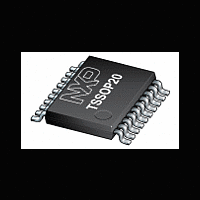P89LPC924_925 NXP Semiconductors, P89LPC924_925 Datasheet - Page 25

P89LPC924_925
Manufacturer Part Number
P89LPC924_925
Description
The P89LPC924/925 are single-chip microcontrollers designed for applicationsdemanding high-integration, low cost solutions over a wide range of performancerequirements
Manufacturer
NXP Semiconductors
Datasheet
1.P89LPC924_925.pdf
(49 pages)
Philips Semiconductors
9397 750 14471
Product data
8.13.7 Additional port features
8.14.1 Brownout detection
8.14.2 Power-on detection
8.14 Power monitoring functions
Digital outputs are disabled by putting the port output into the Input-Only (high
impedance) mode as described in
Digital inputs on Port 0 may be disabled through the use of the PT0AD register,
bits 1:5. On any reset, PT0AD1:5 defaults to ‘0’s to enable digital functions.
After power-up, all pins are in Input-Only mode. Please note that this is different
from the LPC76x series of devices.
Every output on the P89LPC924/925 has been designed to sink typical LED drive
current. However, there is a maximum total output current for all ports which must not
be exceeded. Please refer to
specifications.
All ports pins that can function as an output have slew rate controlled outputs to limit
noise generated by quickly switching output signals. The slew rate is factory-set to
approximately 10 ns rise and fall times.
The P89LPC924/925 incorporates power monitoring functions designed to prevent
incorrect operation during initial power-up and power loss or reduction during
operation. This is accomplished with two hardware functions: Power-on Detect and
Brownout detect.
The Brownout detect function determines if the power supply voltage drops below a
certain level. The default operation is for a Brownout detection to cause a processor
reset, however it may alternatively be configured to generate an interrupt.
Brownout detection may be enabled or disabled in software.
If Brownout detection is enabled, the brownout condition occurs when V
the brownout trip voltage, V
negated when V
a power supply that can be below 2.7 V, BOE should be left in the unprogrammed
state so that the device can operate at 2.4 V, otherwise continuous brownout reset
may prevent the device from operating.
For correct activation of Brownout detect, the V
observed. Please see
The Power-on Detect has a function similar to the Brownout detect, but is designed to
work as power comes up initially, before the power supply voltage reaches a level
where Brownout detect can work. The POF flag in the RSTSRC register is set to
indicate an initial power-up condition. The POF flag will remain set until cleared by
software.
•
•
After power-up, all I/O pins except P1.5, may be configured by software.
Pin P1.5 is input only. Pins P1.2 and P1.3 and are configurable for either input-only
or open-drain.
DD
Rev. 03 — 15 December 2004
rises above V
8-bit microcontrollers with accelerated two-clock 80C51 core
Table 8 “DC electrical characteristics”
BO
Table 8 “DC electrical characteristics”
(see
BO
Section
Table 8 “DC electrical
. If the P89LPC924/925 device is to operate with
8.13.4.
DD
rise and fall times must be
P89LPC924/925
© Koninklijke Philips Electronics N.V. 2004. All rights reserved.
characteristics”), and is
for specifications.
for detailed
DD
falls below
25 of 49















